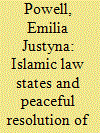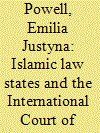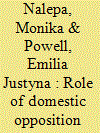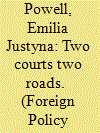|
|
|
Sort Order |
|
|
|
Items / Page
|
|
|
|
|
|
|
| Srl | Item |
| 1 |
ID:
087579


|
|
|
|
|
| Publication |
2009.
|
| Summary/Abstract |
Democratic and autocratic states routinely violate their international agreements protecting human rights. Scholars typically link ratification and compliance behavior theoretically but test their models separately; however, if the behaviors are jointly determined then we should treat them that way empirically. We consider how domestic judiciaries influence the joint choice to ratify and comply with international human rights regimes. Using data on the ratification status of states under the Convention Against Torture (CAT), states' torture practices, and a series of measures of judicial effectiveness, we examine whether legal institutions are likely to constrain state behavior and by implication raise the costs of ratification.
|
|
|
|
|
|
|
|
|
|
|
|
|
|
|
|
| 2 |
ID:
146141


|
|
|
|
|
| Summary/Abstract |
This article argues that specific characteristics of the domestic legal institutions of Islamic law states shape these states' choices of peaceful resolution methods in territorial disputes. After providing original data on the characteristics of Islamic legal structures, I systematically compare pertinent rules of international dispute resolution methods and Islamic law. I demonstrate empirically that not all Islamic law states view international settlement venues in the same way. Secular legal features, such as constitutional mentions of education, supreme court, or peaceful settlement of disputes have the power to attract these states to the most formal international venues—arbitration and adjudication. On the other hand, Islamic law states whose legal system is infused with Islamic religious precepts are attracted to less-formalized venues.
|
|
|
|
|
|
|
|
|
|
|
|
|
|
|
|
| 3 |
ID:
121798


|
|
|
|
|
| Publication |
2013.
|
| Summary/Abstract |
The International Court of Justice (ICJ), as the principal judicial organ of the UN, plays an important role in peaceful resolution of international disputes. Traditionally, relations between Islamic law states, international law, and courts have been relatively tense due to the inherent link between Islamic law and the Islamic faith. Yet, several Islamic law states recognize the ICJ's compulsory and compromissory jurisdiction. This article asks: Why do some Islamic law states extend support to the International Court of Justice, while others turn away from the Court? I argue and empirically demonstrate that specific characteristic of Islamic law can explain variation of Islamic law states' preferences towards the ICJ. After providing original data on the characteristics of Islamic legal structures, I systematically compare pertinent rules of international law and Islamic law, focusing on similarities and differences between the two. Islamic law features such as respect for legal scholarship and peaceful resolution of disputes are compatible with principles embraced by the ICJ. Islamic law states that incorporate these norms are supportive of the Court. In contrast, Islamic law states that directly adopt sharia as the law of the land and incorporate sharia in their education systems are less open to the ICJ's adjudication.
|
|
|
|
|
|
|
|
|
|
|
|
|
|
|
|
| 4 |
ID:
101856


|
|
|
|
|
| Publication |
2011.
|
| Summary/Abstract |
Does a state's past win/loss record affect its subsequent choices of peaceful dispute resolution methods in territorial disputes? We present a theory that portrays attempts at peaceful resolution as a strategic process, by which states search for the most favorable forum. During the process of decision making, a state strategically chooses between several methods of peaceful resolution; its final choice is based on the state's past experience with this particular method. Empirical analysis of all attempts at peaceful resolution of territorial disputes from 1945 to 2003 shows that challenger states use their own record of victories and failures, as well as the win/ loss record of the target as indicators of the probability of winning in a subsequent dispute. This pattern is especially strong for the binding third-party methods, arbitration, and adjudication.
|
|
|
|
|
|
|
|
|
|
|
|
|
|
|
|
| 5 |
ID:
178687


|
|
|
|
|
| Summary/Abstract |
This article introduces the Peaceful Resolution of Territorial Disputes (PRTD) dataset, covering all interstate territorial disputes (1945–2015). Our dataset captures proposals for the peaceful resolution of territorial disputes made by states involved in territorial claims at the disputant-year level. These proposals provide a concrete measure of changing state preferences toward negotiations, non-binding, and binding third-party dispute resolution methods over time. In contrast to existing attempt-level data, the monadic panel design of the dataset captures not only actual attempts at peaceful resolution – the result of an agreement between disputants – but also proposals for methods that did not occur but were preferred at a particular time point. Our dataset allows for robust and generalizable quantitative analyses of the peaceful resolution of territorial disputes that are sensitive to temporal, regional, claim-based, and state-level trends. To demonstrate the utility of our dataset, we use hybrid logistic regression to examine the determinants of binding PRTD proposals. Over-time changes in characteristics such as regime type and treaty commitments influence attitudes toward binding settlement methods differently than disputant-level measurements. We also show that time has a distinctively non-linear effect.
|
|
|
|
|
|
|
|
|
|
|
|
|
|
|
|
| 6 |
ID:
148321


|
|
|
|
|
| Summary/Abstract |
This article considers how international criminal justice administered by the International Criminal Court (ICC) affects the possibility of negotiated, peaceful transitions of power in autocracies. We argue that a strong international criminal tribunal can deter dictators’ decisions to peacefully relinquish their power. It does so when the dictator in question has faced a relatively violent opposition, one that was ready to strike a deal with the dictator promising him amnesty in exchange for stepping down. Facing an opposition that “has skeletons in its closet,” the dictator will peacefully exit his office only under a weak ICC regime. We use a cross-national time-series data set spanning 1998 to 2007 to test our theory and find that under a weak ICC regime, the more skeletons the opposition has in its own closet, the more likely is the dictator to peacefully step down from office. Interestingly, this relationship holds, to a large extent, across various levels of dictator’s culpability. If the ICC is strong, the number of skeletons the opposition has in its closet has, for the most part, no effect on the dictator’s likelihood of stepping down.
|
|
|
|
|
|
|
|
|
|
|
|
|
|
|
|
| 7 |
ID:
132351


|
|
|
|
|
| Publication |
2014.
|
| Summary/Abstract |
States involved in territorial disputes have several options with regard to resolving their disputes. What types of states are more likely to resort to legal methods of peaceful resolution in attempting to resolve their territorial disputes? We posit that two separate mechanisms affect states' decisions to choose legal methods of peaceful resolution: the legal mechanism - domestic rule-of-law, and the political mechanism - win/loss record. Rule-of-law based arguments cannot fully explain states' behavior towards arbitration and adjudication. It is the interplay of both of these mechanisms that explains the strategic choices made by states with regards to arbitration and adjudication. We explain why some high rule-of-law states return to binding methods, while others turn to different forums, and why low rule-of-law states consider binding methods. Empirical analyses of all attempts at peaceful resolution of territorial disputes from 1985 to 2006 show that high rule-of-law states are more likely to return to international binding venues only if they have a positive experience with these methods. On the other hand, we find that low rule-of-law states are not concerned with their record of successes/failures when resorting to international binding venues. Overall, the effect of regime type/rule-of-law is conditioned by past successes and failures in international resolution venues.
|
|
|
|
|
|
|
|
|
|
|
|
|
|
|
|
| 8 |
ID:
124600


|
|
|
|
|
| Publication |
2013.
|
| Summary/Abstract |
The International Court of Justice (ICJ) and the International Criminal Court (ICC) constitute two prominent international courts. However, there exists considerable variation in states' support for these two institutions. The Rome Statute, which recognizes the jurisdiction of the ICC has been ratified by over half the states in the world; only a third of states accept the compulsory jurisdiction of the ICJ. How are we to understand this variation in state support for these two courts? I argue that there is an inherent link between the quality of a state's domestic legal system (rule of law) and perceived legitimacy of an international court. Empirical analyses of states' support for the ICJ and the ICC show that rule-of-law states lend support to the ICC, a court perceived by the international community as legitimate. Alleged bias of the ICJ has, on the other hand, substantially weakened support for this court among rule-of-law states.
|
|
|
|
|
|
|
|
|
|
|
|
|
|
|
|
|
|
|
|
|